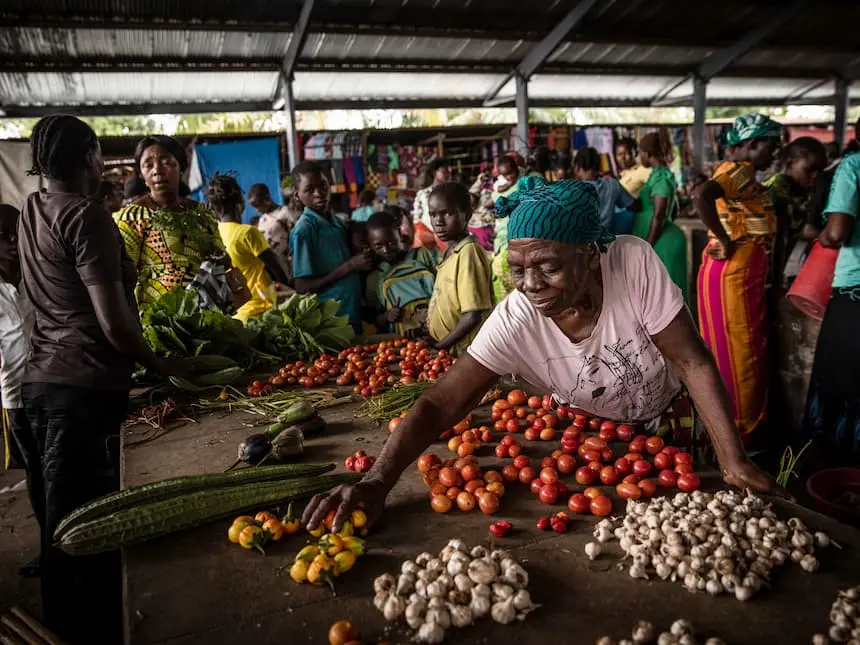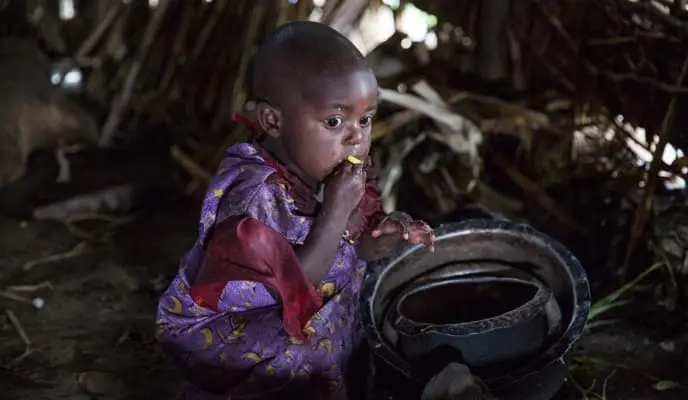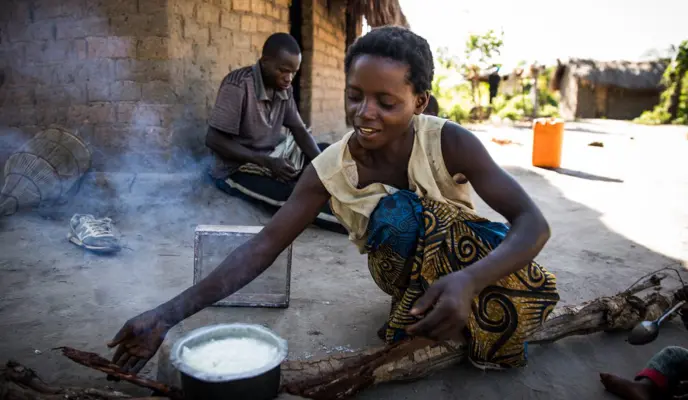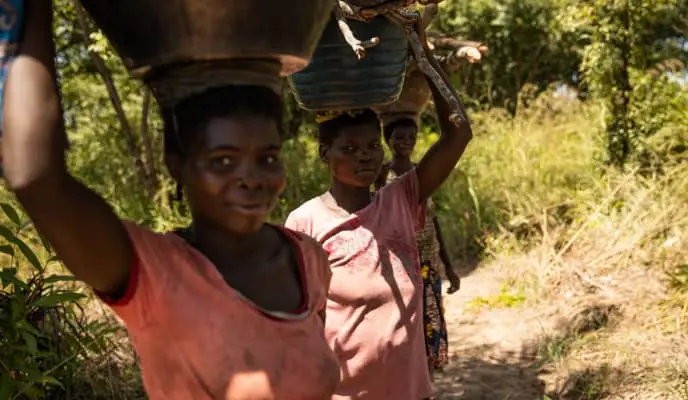What We Do
Our Work: Health & nutrition
Ending global extreme poverty means we also have to end hunger. You can help us with both.
Read MoreOne in three people suffer from hunger in the DRC, which in terms of numbers is home to the world’s largest food crisis. Here’s what to know in 2021.
For the first time in years, Concern and Welthungerhilfe had enough data on hunger in the Democratic Republic of Congo to include the country in our 2021 Global Hunger Index. Unfortunately, it’s often the countries where we’re unable to get complete data that have some of the most alarming levels of hunger. Out of the ten hungriest countries in the world, the DRC ranks fifth (second only to Chad, the CAR, Yemen, and Somalia).
The DRC is now the biggest food security crisis in the world, with over 27 million people facing severe or acute food insecurity. Some areas, like Tanganyika province, are facing extreme food insecurity, bordering on a level where preventable deaths related to famine and starvation are likely to occur. This is our last chance to raise the alarm and turn the situation around.
Here’s what that means, and what we know about hunger in the DRC in 2021.
In December 2020, the Food and Agriculture Organization categorized the DRC as having the world’s biggest food crisis in terms of number of affected people. From our most recent Global Hunger Index, we classify the DRC as one of 50 countries having an Alarming Level of hunger. What does that look like in numbers?
Overall undernourishment affects 41.7% of the country’s population of 89.56 million adults and children. That means over 37 million Congolese are not getting the baseline level of nutrients they need to stay healthy.
The DRC also has the fifth-highest child stunting rates for 2021, with 41.8% of the country’s children reporting a low height based on malnutrition. This is especially high in areas most affected by violence.
By comparison, the DRC’s wasting and child mortality rates are lower, at 6.4% and 8.5%, respectively. However, these are still numbers that should be under 1%.

Many areas facing a food crisis do so because of one or two key causes of hunger. The DRC has more than a few. The economics of hunger hit especially hard here, where 72% of the population is living below the poverty line. In 2019, the country also ranked 179 out of 189 countries on the UN’s Human Development Index. This trickles down to the most vulnerable families and communities, who lack the funds required for day-to-day survival.
What’s more, this has been the case for decades. The DRC’s economy formally collapsed in 1994, a year in which inflation peaked at 24,000%. In 1999, the Congolese franc was reported to have devalued by over 35%, which at the time led to an exchange rate of 4.5 francs to the US dollar. That year, food prices in the country increased by 14%. By 2016, the devaluation had plummeted to nearly 1,000 francs to the dollar.
Economics, however, are just one layer of vulnerability in the DRC: The University of Notre Dame’s 2018 ND-GAIN Country Index listed the republic as the fifth most-vulnerable country in the world when it came to climate change, based on a high level of risk to climate disasters and a low level of adaptability in terms of a response to those risks. Other non-climate related issues persist in the country, including diseases that kill livestock and pests that destroy crops.

The DRC has been caught in a protracted humanitarian crisis that arguably began with the country’s colonization by Belgium, a 90-year period marked by forced labor, exploitation of natural resources, disease, and mass killings. The transition from colony to republic, however, was not a fix-all solution, and led to a 36-year dictatorship, two Congo Wars, and ongoing localized violence and instability throughout the country.
Conflict disrupts livelihoods and economies, and also creates a tenuous present and even less-certain future for the people living in conflict zones. The ongoing violence and instability in the DRC has led to one the world’s largest refugee crises, with nearly 5.5 million Congolese uprooted from home.
The nature of conflict in the DRC is incredibly complex, with roots in both domestic insecurity and international friction. While the country experienced its first peaceful transition of presidential power in 2019, it continues to face challenges, especially in the wake of COVID-19. In several eastern provinces, the security situation worsened in 2020. In provinces like South Kivu and Tanganyika, disputes continue to escalate over land, access to economic and natural resources, political disagreements, and abuses of power.
“What the brave people I met [in the DRC] want most of all is peace — peace to be able to grow their own food, to rebuild their lives and to build a brighter tomorrow for their children. It’s a simple, powerful message.” — David Beasley (Director, World Food Programme)
Currently, only 10% of arable land in the DRC is being cultivated. This is an issue as the country is almost entirely dependent on food imports, which were affected by pandemic-related border closures (thus leading to further inflation). However, within this challenge is an opportunity: If peace can be sustainably won in the country, this could allow for development to accelerate in agriculture. The country has nearly 200 million acres of cultivable land.
It could also allow for economic development in other areas that would result in a net-positive for ending hunger in the DRC: In addition to land, the country is also home to large reserves of diamonds, gold, copper, cobalt, zinc, and coltan (which is used in mobile phones and other electronics).

A 2020 Search for Common Ground report highlighted the two-way street that exists between conflict and hunger. Its evaluation of a Food for Work program run by the nonprofit Food for the Hungry in South Kivu and Tanganyika found that the program itself became the source of conflict and tensions in the area. SCG wrote that, by not adequately consulting with the local communities participating in the program, the project led to “social divisions at the community level, particularly between beneficiaries and non-beneficiaries, and also between Bantu and Twa communities” who believed that program participants had been selected on the basis of their ethnicity.
The lesson from this is not that these initiatives don’t work. Rather, it’s an important reminder that conflict adds another, complex layer to addressing even the most basic human needs. Hunger will only be solved in the DRC through addressing inequality, fostering inclusion, and working through a conflict-sensitive lens in order to curb rumors and ensure community-level support. Building on approaches that strengthen systems, either at the community or a broader health system level, will help to contribute to ownership and sustainability.

Concern has been active in the Democratic Republic of Congo for over a quarter of a century, with programs built around health and nutrition, livelihoods and agriculture, and water, sanitation, and hygiene. In response to deepening humanitarian needs across the country, we are implementing emergency and development programming in North Kivu and Tanganyika.
Last year, our mobile Rapid Response team responded to five displacement crises, providing emergency support to households fleeing conflict or natural disasters and helping them to buy food, access clean water, and obtain hygiene kits. In total, 159,000 recently displaced people were supported by Concern.
In eastern Democratic Republic of Congo, also in 2020, we worked with over 140,000 people displaced by the ongoing crisis to improve their living conditions and their livelihoods. Over the course of the year, 92 water points were rehabilitated, giving improved water supplies to 92,000 people. In addition, 832 community health volunteers were trained to promote good hygiene practices and reached over 125,000 people with good results: 93% of people surveyed at the end of the project knew at least three of the five critical moments for hand-washing that are vital to reducing the spread of disease. Over 15,000 people were helped to rebuild their livelihoods through training and/or cash transfers, and another 2,200 were helped to earn an income through cash for work opportunities.